|
|
|
Sort Order |
|
|
|
Items / Page
|
|
|
|
|
|
|
| Srl | Item |
| 1 |
ID:
092620
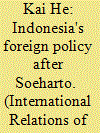

|
|
|
|
|
| Publication |
2008.
|
| Summary/Abstract |
Indonesian politics opened a new phase of democratization after Soeharto stepped down from his 32 years of authoritarian rule. In this paper, Indonesia's foreign policy changes after Soeharto are systematically examined through an 'international pressure-political legitimacy' model derived from neoclassical realism. This model specifies that Indonesia's foreign policy during democratization is mainly influenced by two factors: international pressure and the political legitimacy of the new democratic government. Four cases of foreign policy decision-making from three post-Soeharto presidencies are examined: (i) Indonesia's East Timor policy under Habibie; (ii) Indonesia's 'silence response' toward China's protest on the anti-Chinese riots under Habibie; (iii) Wahid's 'looking towards Asia' proposal; and (iv) Megawati's anti-terrorism and Aceh military operation. The results show that political legitimacy shapes the nature of state behavior, i.e. balancing or compromising, whereas international pressure determines the pattern of state behavior, i.e. external/internal balancing or compromising in words/in deeds
|
|
|
|
|
|
|
|
|
|
|
|
|
|
|
|
| 2 |
ID:
144874
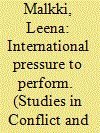

|
|
|
|
|
| Summary/Abstract |
The major terrorist attacks in Western countries during the last fifteen years have had consequences way beyond the countries in which they have happened. The article provides a primary source–based account of the development of counterterrorism policy in Finland, which is one of those countries with a low national threat level. The article demonstrates the significant role that international pressure, through obligations, recommendations, and social learning, plays in developing national counterterrorist policies. The article calls also into question whether the pressure to comply with international pressure always contributes toward sound national counterterrorism policies that foster political resilience to terrorism.
|
|
|
|
|
|
|
|
|
|
|
|
|
|
|
|
| 3 |
ID:
125092


|
|
|
|
|
| Publication |
2013.
|
| Summary/Abstract |
AFTER A year and a half of violence and tens of thousands of deaths in Syria, the UN Security Council convened in July 2012 to consider exerting additional international pressure on President Bashar al-Assad. And for the third time in nine months, Russia and China vetoed any moves toward multilateral intervention. Less than two weeks later, Kofi Annan resigned as the joint UN-Arab League special envoy for Syria, lamenting, "I can't want peace more than the protagonists, more than the Security Council or the international community for that matter."
|
|
|
|
|
|
|
|
|
|
|
|
|
|
|
|
| 4 |
ID:
152075
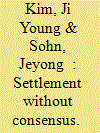

|
|
|
|
|
| Summary/Abstract |
What has shaped contemporary discourse on Japan’s comfort women issue? During the last twenty-five years, civic groups in both Japan and South Korea have made significant efforts to publicize the issue within the international community, hoping to narrow the disparity between the position of the international community and that of the Japanese government. Thus far, however, Japan’s official position has shown little change. Why has international pressure on Japan failed? By focusing on the relationship between international pressure and the formation of Japan’s discourse on the comfort women issue, this paper shows how outside pressure led to a domestic backlash among conservatives in Japan, resulting in the failure to institutionalize apologetic discourse within Japanese society. This study will provide important insights on how democratic countries can sometimes resist strong external pressure to conform to international norms.
|
|
|
|
|
|
|
|
|
|
|
|
|
|
|
|
| 5 |
ID:
132804
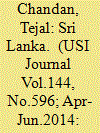

|
|
|
|
|
| Publication |
2014.
|
| Summary/Abstract |
Since the end of the war in Sri Lanka in May 2009, the discourse on Sri Lanka has largely revolved around the country's human rights record and the Government's attempts at redressing Tamil grievances. Revelations in international media about the scale of human rights violations during the last phase of the military operations against the Liberation Tigers of the Tamil Eelam (LTTE) led to mounting international pressure on Sri Lanka for accountability of war crimes. The Sri Lankan Government (SLG), in turn, made efforts to address the issues of resettlement of Internally Displaced Persons (zDPs) and the economic development of war affected zones in the Northern and Eastern Provinces of the country. President Mahinda Rajapakse also constituted the Lessons Learnt and Reconciliation Commission (LLRC) to recommend measures to address the Tamil problem and framed a National Action Plan (NAP) to implement its recommendations. However, key Tamil grievances, related to the devolution of power, remained largely neglected. Attempts at fixing the accountability for human rights violations were also half-hearted. This was evident in the widely publicised Army Court of Inquiry, appointed to investigate allegations of war crimes, which eventually absolved the Army of any wrong- doing'. This in turn, shaped the international opinion on the SLG's willingness to resolve the Tamil problem. Today the prospects for
reconciliation in Sri Lanka are linked to certain key issues. These include (i) Action related to human rights accountability, (ii) Resumption of dialogue between the main Tamil Party, Tamil National Alliance (TNA), and the Government on finding a political solution to the Tamil grievances and, (iii) Preventing the rise of religious intolerance in the country. The contemporary issues with regard to these aspects are discussed in this paper.
|
|
|
|
|
|
|
|
|
|
|
|
|
|
|
|
| 6 |
ID:
119091
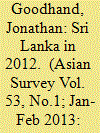

|
|
|
|
|
| Publication |
2013.
|
| Summary/Abstract |
Since the end of the civil war in May 2009, Sri Lanka's government has continued to consolidate the unitary state and centralize power by combining political reform, patronage, and economic development. However, two forces countering such unity and centralization became evident during the course of the year. First, tensions and contradictions associated with the simultaneous pursuit of political centralization alongside rapid economic development and liberalization. Second, there has been an intensification of external pressures to bring about a political settlement with the Tamils and to address government accountability, including its alleged involvement in war crimes.
|
|
|
|
|
|
|
|
|
|
|
|
|
|
|
|
|
|
|
|
|